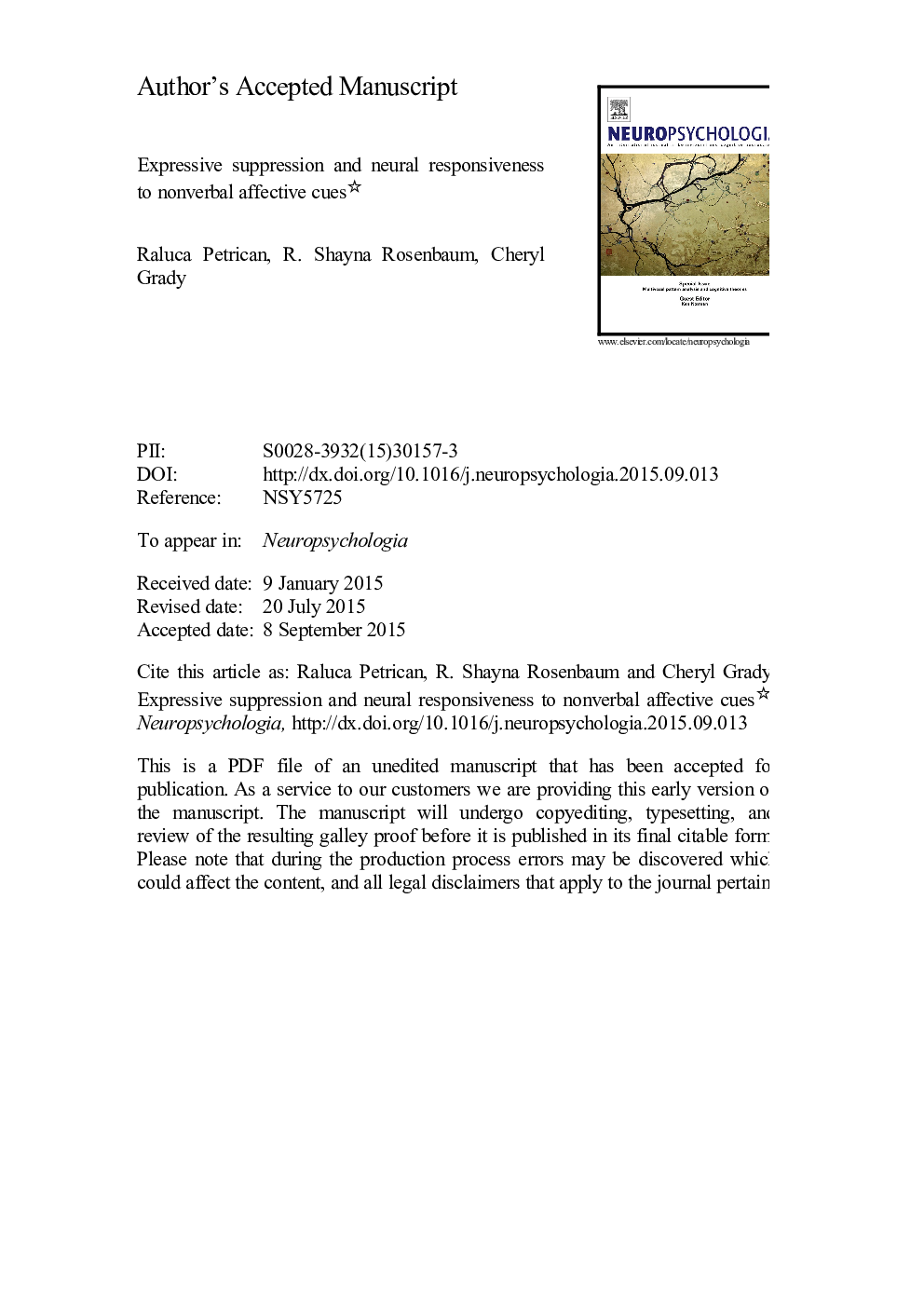| کد مقاله | کد نشریه | سال انتشار | مقاله انگلیسی | نسخه تمام متن |
|---|---|---|---|---|
| 7319816 | 1475576 | 2015 | 45 صفحه PDF | دانلود رایگان |
عنوان انگلیسی مقاله ISI
Expressive suppression and neural responsiveness to nonverbal affective cues
ترجمه فارسی عنوان
سرکوب افسانه ای و پاسخ عصبی به نشانه های عاطفی غیر کلامی
دانلود مقاله + سفارش ترجمه
دانلود مقاله ISI انگلیسی
رایگان برای ایرانیان
کلمات کلیدی
سرکوب افسانه ای، هیجانی، کنترل شناختی، نشانه های غیر کلامی،
موضوعات مرتبط
علوم زیستی و بیوفناوری
علم عصب شناسی
علوم اعصاب رفتاری
چکیده انگلیسی
Optimal social functioning occasionally requires concealment of one's emotions in order to meet one's immediate goals and environmental demands. However, because emotions serve an important communicative function, their habitual suppression disrupts the flow of social exchanges and, thus, incurs significant interpersonal costs. Evidence is accruing that the disruption in social interactions, linked to habitual expressive suppression use, stems not only from intrapersonal, but also from interpersonal causes, since the suppressors' restricted affective displays reportedly inhibit their interlocutors' emotionally expressive behaviors. However, expressive suppression use is not known to lead to clinically significant social impairments. One explanation may be that over the lifespan, individuals who habitually suppress their emotions come to compensate for their interlocutors' restrained expressive behaviors by developing an increased sensitivity to nonverbal affective cues. To probe this issue, the present study used functional magnetic resonance imaging (fMRI) to scan healthy older women while they viewed silent videos of a male social target displaying nonverbal emotional behavior, together with a brief verbal description of the accompanying context, and then judged the target's affect. As predicted, perceivers who reported greater habitual use of expressive suppression showed increased neural processing of nonverbal affective cues. This effect appeared to be coordinated in a top-down manner via cognitive control. Greater neural processing of nonverbal cues among perceivers who habitually suppress their emotions was linked to increased ventral striatum activity, suggestive of increased reward value/personal relevance ascribed to emotionally expressive nonverbal behaviors. These findings thus provide neural evidence broadly consistent with the hypothesized link between habitual use of expressive suppression and compensatory development of increased responsiveness to nonverbal affective cues, while also suggesting one explanation for the suppressors' poorer cognitive performance in social situations. Moreover, our results point to a potential neural mechanism supporting the development and perpetuation of expressive suppression as an emotion regulation strategy.
ناشر
Database: Elsevier - ScienceDirect (ساینس دایرکت)
Journal: Neuropsychologia - Volume 77, October 2015, Pages 321-330
Journal: Neuropsychologia - Volume 77, October 2015, Pages 321-330
نویسندگان
Raluca Petrican, R. Shayna Rosenbaum, Cheryl Grady,
